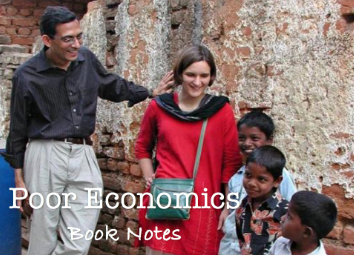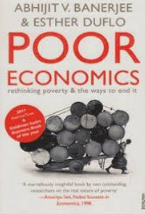|

Abandon the habit of reducing the poor to cartoon characters
|
POOR ECONOMICS written by Abhijit V. Banerjee and Esther Duflo - is a path breaking book that will help you to understand the real causes of poverty and how to end it. The book appreciated as A Radical Rethinking to Fight Global Poverty.
Through their work they look at some of the most surprising facts of poverty: why the poor need to borrow in order to save, why they miss out on free life-saving but pay for drugs that they do not need, why they start many businesses but do not grow any of them.
Poor Economics argues that so much of anti-poverty policy has failed over the years because of an inadequate understanding of poverty. The battle against poverty can be won, but it will take patience, careful thinking and a willingness to learn from evidence. Abhijit and Esther are practical visionaries whose meticulous work offers transformative potential for poor people anywhere, and is a vital guide to policy makers, philanthropists, activists and anyone else who cares about building a world without poverty.
Two practical visionaries working toward ending world poverty. The Wall Street Journal commented on the book, marvelous & rewarding.
Billions of government dollars and thousands of charitable organizations and NGOs, are dedicated to help the poor people. But much of their work is based on assumptions about the poor and the world that are untested generalizations at best,
|
|
harmful misperceptions at worst
By paying careful attention to the evidence, it is possible to make accurate and often startling assessments on what really impacts the poor and what doesn't, said the authors.
Abhijit V. Banerjee and Esther Duflo have pioneered the use of Randomized Control Trials (RCTs) in development economics through their award-winning Poverty Action Lab.
They argue that by using Randomized Control Trials and more generally, by paying careful attention to the evidence, it is possible to make accurate and often startling assessments on what really impacts the poor and what doesn't.
For more than fifteen years, they have worked with the poor in dozens of countries spanning five continents, trying to understand the specific problems that come with poverty and to find proven solutions.
Abhijit said, I absolutely don’t believe in restricting good policy out of political prejudice.
Esther’s stand is - You have to think big, and it is possible to make a real difference in the life of poor people.
China going for labour-intensive manufacturing and that is one sector that can absorb millions of people. India create jobs in real estate services but not in manufacturing. India missed that bus, and Bangladesh picked it up, they reacts.
Abhijith says, I am very much in favour of higher taxes a high incomes. There should be a
|
|
|
way to use the tax system to deal with in-equality.
Warren Buffet keeps saying, I pay low taxes because you have set up the tax system so that I can pay low taxes Esther emphasis that, It is important to have a simpler, transparent and well-designed tax system.
They observes, the economic slowdown is not just in India. It’s also in China. There are also fears of recession in the US & Europe. Problem is everywhere. The thing is to acknowledge it and not do silly things. Government can do two things in bad times to protect the poor – not slashing social programmes, and using existing money even better.
Abhijit Vinayak Banerjee was educated at the University of Calcutta, Jawaharlal Nehru University, and Harvard University. He is currently the Ford Foundation International Professor of Economics at MITHe is the recipient of many awards, and has been an honorary advisor to many organizations including the World Bank and the Government of India. Together with Esther Duflo and Sendhil Mullainathan of Harvard University, he founded the Abdul Latif Jameel Poverty Action Lab in 2003.
Esther Duflo was educated at the Ecole Normale Supérieure, in Paris, and at MIT. She has received numerous honors and prizes including a John Bates Clark Medal for the best American economist under 40 in 2010, a MacArthur “genius” Fellowship in 2009. She was recognized as one of the best eight young economists by the Economist Magazine, one of the 100 most influential thinkers by Foreign Policy.
Esther was six when she read in a comic book on Mother Teresa that the city then called Calcutta was so crowded that each person had only 10 square feet to live in. She had a vision of a vast checkerboard of a city, with 10-foot squares marked out on the ground, each with a human pawn, as it were, huddled into it. She wondered what she could do about it.
When she finally visited Calcutta, she was twenty-four and a graduate student at MIT. Looking out of the taxi on her way to the city, she felt vaguely disappointed; everywhere she looked, there was empty space—trees, patches of grass, empty sidewalks. Where was all the misery so vividly depicted in the comic book? Where had all the people gone?
At six, Abhijit knew where the poor lived. They lived in little ramshackle houses behind his home in Calcutta. Their children always seemed
|
|
to have lots of time to play, and they could beat him at any sport: This urge to reduce the poor to a set of clichés has been with us for as long as there has been poverty: The poor appear, in social theory as much as in literature, by turns lazy or enterprising, noble or thievish, angry or passive, helpless or self-sufficient. It is no surprise that the policy stances that correspond to these views of the poor also tend to be captured in simple formulas: “Free markets for the poor,” “Make human rights substantial,” “Deal with conflict first,” “Give more money to the poorest,” “Foreign aid kills development,” and the like. These big ideas all have important elements of truth, but they rarely have much space for average poor women or men, with their hopes and doubts, limitations and aspirations, beliefs and confusion too often, the economics of poverty gets mistaken for poor economics: . If the poor appear at all, it is usually as the dramatis personae of some uplifting anecdote or tragic episode, to be admired or pitied, but not as a source of knowledge, not as people to be consulted about what they think or want or do. All because the poor possess very little, it is assumed that there is nothing interesting about their economic existence. Unfortunately, this misunderstanding severely undermines the fight against global poverty: Simple problems beget simple solutions.. To progress, we have to abandon the habit of reducing the poor to cartoon characters and take the time to really understand their lives, in all their complexity and richness. For the past fifteen years, we have tried to do just that, the couples says on existing social order.

|
|
|
